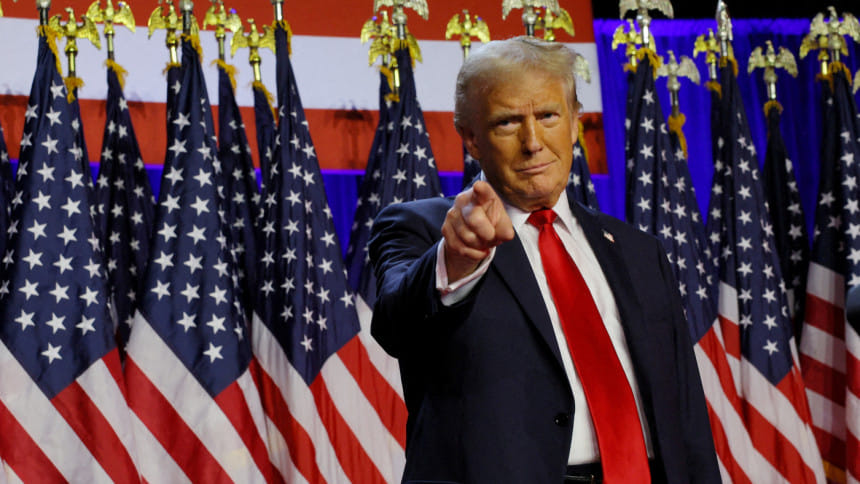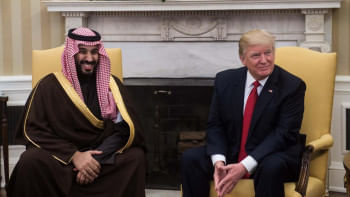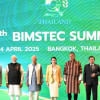View from the US: Donald Trump’s election

As we approach the January 20 inauguration of Donald Trump for his second term as the US president, Bangladeshis are reflecting on the US presidential election's outcome and examining the changes in the diaspora's politics. In the run-up to the election, a growing number of Bangladeshis reported dissatisfaction with the Democratic Party. Now that the election has concluded, it appears that murmurs of a rightward shift towards Donald Trump in the diaspora were rooted in reality.
Many areas with large Bangladeshi populations saw a jump in the popularity of Donald Trump and a decrease in votes for the Democratic Party compared to support for previous liberal presidential candidates. In Michigan's Hamtramck, a majority-Muslim town where Bangladeshis make up the largest portion of the population, net support for Trump saw a shift of 29 percentage points, even though Kamala Harris carried the majority of votes. Reasons for the shift are numerous, encompassing the varied issues Bangladeshis expressed concern about in the weeks leading up to the election, including the economy and the Gaza war.
ASM Kamal Rahman, a Democrat and Bangladeshi-American community activist in Hamtramck, broke with his party and voted for Trump because of taxes and economic issues. He told Voice of America, "I think everybody that lives here, they look at the issues that affect them here: the economy, the education system affecting the families." Mohammad Alauddin, a Bangladeshi immigrant in Hamtramck who voted for Trump in this election, after having previously voted for Biden, considered the Democratic response to the Gaza war to be the impetus for his decision.
These common concerns also played a role in New York City, where the Democratic margins have significantly fallen compared to previous years. Nearly half of Bangladeshi-Americans live in New York, a majority of whom live in the NY-14 district, which is represented by noted progressive politician Alexandria Ocasio-Cortez. Though Harris won the NY-14 district, the 2024 election saw a 22-point shift in the margins between Democrats and Republicans compared to 2020, while Ocasio-Cortez saw only a six-point reduction in her net margin.
These reports signal a sharp shift in the Bangladeshi demographic's voting, as they have traditionally prioritised liberal politics, with 91 percent voting for Joe Biden in 2020, according to the National Asian American Survey. It remains to be seen if this increased support for Trump among Bangladeshi-Americans will translate into benefits. While democracy is often discussed in terms of individuals and groups voting for their own interests, it is unclear if Trump's presidency will benefit, rather than negatively impact, Bangladeshis.
Trump, known for his erratic rhetoric towards immigrants, has promised mass deportations, which could prove threatening to the safety of the predominantly Muslim Bangladeshi-American population, or at the very least, will cause disruptions in their communities as the promised mass deportation begins "on Day 1."
Furthermore, the impact of his economic policies on Bangladeshi-Americans is not yet clear. Trump has promised to make housing more affordable, help the middle-class group, and decrease prices, but it is uncertain whether this can be achieved. One of his key economic policies is the raising of tariffs, which could affect global trade dynamics and Bangladesh-US trade.
Further complicating his potential Bangladesh policy, Trump has a warm personal relationship with Indian Prime Minister Narendra Modi, and in a Diwali message on November 1 on the social media platform X, he condemned what he referred to as "the barbaric violence against Hindus, Christians, and other minorities who are getting attacked and looted by mobs in Bangladesh, which remains in a total state of chaos," alluding to an untrue narrative of Hindu persecution. This could lead to a negative impact on Bangladesh-US relations at a crucial juncture in Bangladeshi politics.
Due to these dynamics, when Donald Trump takes office on January 20, Bangladeshis will have to reckon with what the Trump presidency will mean in the United States and at home.
Sophia Ahmed is a Bangladesh-American student journalist living in New York.
Views expressed in this article are the authors' own.
Follow The Daily Star Opinion on Facebook for the latest opinions, commentaries, and analyses by experts and professionals. To contribute your article or letter to The Daily Star Opinion, see our submission guidelines.

 For all latest news, follow The Daily Star's Google News channel.
For all latest news, follow The Daily Star's Google News channel. 









Comments